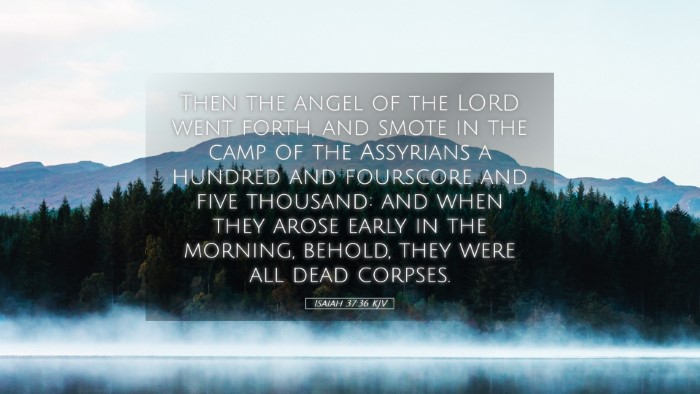Commentary on Isaiah 37:36
Bible Verse: “And the angel of the Lord went out, and smote in the camp of the Assyrians a hundred and fourscore and five thousand: and when they arose early in the morning, behold, they were all dead corpses.”
Introduction
This profound verse from Isaiah presents a remarkable display of divine intervention in the history of Israel during a period of great crisis. Following the threats posed by Sennacherib, the king of Assyria, this passage reveals God's power and faithfulness to His people. Various public domain commentaries provide insights into the theological, historical, and literary significance of this momentous event.
Theological Insights
Divine Intervention: The immediate takeaway from this verse is the intervention of God through His angel. As noted by Matthew Henry, God's angels are His ministers, executing His will on earth. The sudden defeat of the Assyrian army underscores the notion that the battle is ultimately the Lord's (1 Samuel 17:47).
God’s Sovereignty: Albert Barnes emphasizes the sovereignty of God in protecting His people. The massive numerical defeat of the Assyrians serves to illustrate God's ability to save, regardless of human circumstances or armies arrayed against Him. This challenge to Assyrian supremacy reminds believers of God's ultimate authority over all nations and rulers.
Historical Context
In the time leading up to this verse, the kingdom of Judah faced imminent invasion by the powerful Assyrian empire. Sennacherib's campaign was marked by terror and destruction, as noted by Adam Clarke. This historical backdrop enhances the significance of the angelic deliverance narrated in Isaiah 37:36.
Both contemporary accounts in the biblical narrative and extrabiblical sources confirm that the Assyrians were formidable adversaries, known for their ruthlessness. Therefore, Judah's survival through such divine intervention becomes not only a miracle but also an affirmation of God’s commitment to His covenant with Israel.
Literary Analysis
This verse serves as a climactic moment in the broader narrative of Isaiah. The structure of the text draws attention to the contrast between the fearful state of Judah and the sudden reversal of fortune when God acts through His messenger.
- Imagery of Death: The depiction of "dead corpses" paints a vivid and sobering picture of the consequences of opposing God’s will.
- Numerical Significance: The specific numerical mention of "a hundred and fourscore and five thousand" not only illustrates the extent of the defeat but underscores God's power in overwhelming odds.
Lessons for Pastors and Theologians
This verse holds substantial theological implications and offers critical lessons for ministry:
- Reliance on Prayer: Previously, Hezekiah prayed fervently for deliverance, illustrating the importance of prayer as a means of seeking God’s intervention (Isaiah 37:15). Pastors are reminded to encourage congregants to engage in earnest prayer, particularly in crises.
- God’s Faithfulness: The outcome reinforces a deep theme in Scripture: God is faithful to His promises. The assurance of protection and deliverance serves as a comforting reminder to those facing threats or trials.
- Hope in Despair: For students and scholars studying the nature of God’s intervention, this passage exemplifies that hope can arise even in seemingly dire situations. It encourages believers to view challenges through the lens of faith rather than fear.
Application for Today's Believers
As believers reflect on Isaiah 37:36, they are reminded that God remains the same today as He was in ancient times. The God who delivered Judah from destruction is the same God who watches over His people currently:
- Faith over Fear: The experience of ancient Israel teaches that faith must triumph over fear, providing a framework for believers to trust God amidst modern uncertainties.
- Awareness of Spiritual Warfare: Just as there were unseen angelic forces at work during the days of Isaiah, today's believers are reminded of the spiritual battles faced in their lives, necessitating reliance on God’s power.
Conclusion
Isaiah 37:36 encapsulates a powerful moment of divine intervention, showcasing God's authority over earthly powers and encouraging unwavering faith among His people. As pastors, students, and scholars delve into this verse, may they find both instruction and inspiration in the reassurance of God's sovereign presence and His promise to protect and deliver His faithful followers.


